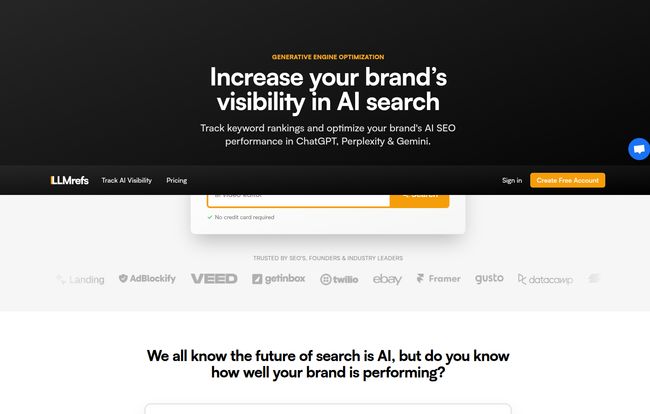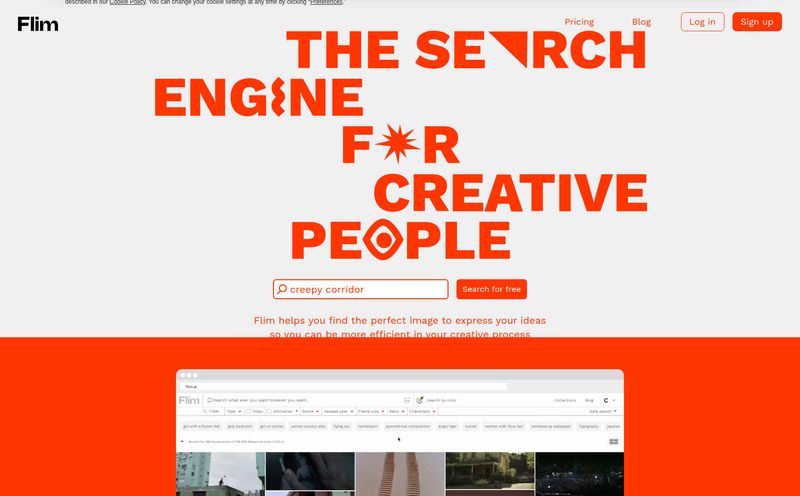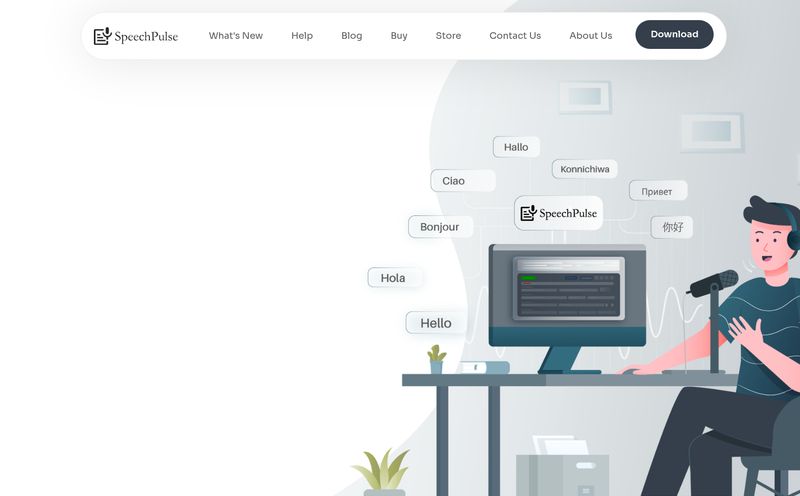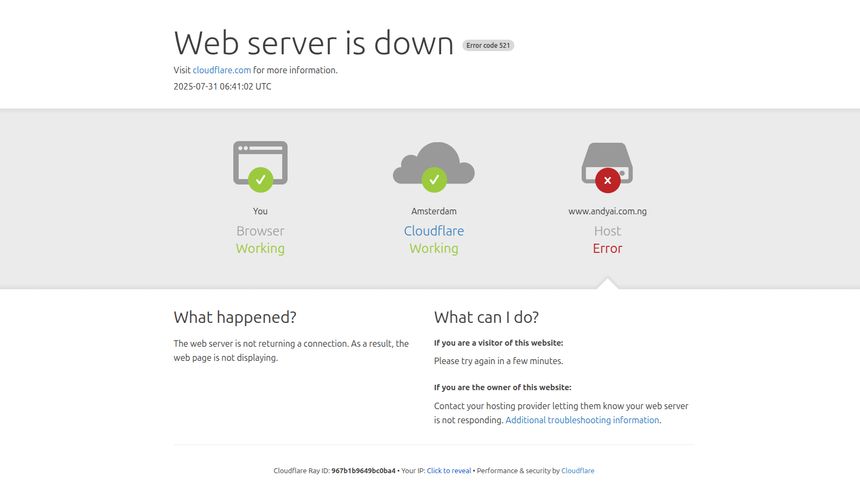I’ve been in the SEO game for a while now. Long enough to remember when getting a keyword on the first page of Google felt like the entire world. We obsessed over keyword density, backlinks from high DA sites, and the perfect meta description. It was a science, a predictable, if sometimes frustrating, one. But let’s be real, that world is starting to feel a little… quaint.
The ground is shifting beneath our feet, and the tremor is coming from generative AI. With things like Google’s AI Overviews, Perplexity, and people using ChatGPT as their primary search engine, the classic 10 blue links are becoming an endangered species. So the question that keeps me up at night, and probably you too, is: How do you rank when there are no 'ranks'? How do you measure success when your goal isn’t to be a link, but a citation inside a paragraph of AI-generated text?
It's a bit like the wild west all over again. We're all pioneers trying to map this new territory. And recently, I stumbled upon a tool that feels like one of the first proper cartography sets for this new world: LLMrefs.
What Exactly is LLMrefs? And Why Should You Care?
Okay, let's break it down. At its core, LLMrefs is an SEO platform designed specifically for the age of AI search. Think of it as a keyword tracker, but instead of monitoring your position on a search engine results page (SERP), it monitors how and if your brand gets mentioned or cited in the answers from Large Language Models (LLMs) like ChatGPT, Gemini, and Perplexity.
This is a fundamental change in thinking. We're moving from a game of visibility to a game of authority and sourcing. It’s no longer enough to be on the page; you need to be the source the AI trusts. LLMrefs is built to give you the data to see if you are. It’s for the SEO professional who’s looking around the corner and realizing that the corner is coming up fast.

Visit LLMrefs
Peeking Under the Hood: The Core Features
So it tracks AI mentions. Cool. But what does that actually look like in practice? I got a chance to poke around, and a few features really stood out to me as being more than just bells and whistles. They feel like necessities for this new era.
AI Keyword Tracking (But Not As You Know It)
The first thing you’ll notice is the keyword tracking. You plug in your keywords just like you would with any other tool. But the output is completely different. Instead of a 'Position 3' result, you get insights into how often your content is being used to answer questions related to that keyword across different AI models. LLMrefs has its own proprietary metric called the LLMrefs Score (LS). I think of it as a kind of 'AI Authority' score. It aggregates your performance, giving you a single, easy-to-understand number that tells you how well you're doing in this new ecosystem. It's a brand new KPI for a brand new ballgame.
Sizing Up the Competition in the AI Arena
One of my favorite things to do with any new SEO tool is spy on the competition. LLMrefs handles this beautifully. You can see which competitors are getting cited for your target keywords. This is gold. It’s not just about seeing who is ranking above you; it’s about understanding why their content is being seen as more authoritative by the AI. You can spot gaps in their coverage and find incredible opportunities. Maybe a competitor is crushing it on ChatGPT but is invisible on Perplexity. That's your opening. It’s a much more strategic and nuanced form of competitor analysis than I'm used to.
Understanding the "Mind" of the Machine
This part is genuinely fascinating. The tool provides analysis on AI model biases. And no, we're not talking about political bias here. We're talking about the subtle differences in how different models interpret information and rank content. A piece of content that performs brilliantly on OpenAI's ChatGPT might fall flat on Google's Gemini. Why? Maybe Gemini prefers more data-driven sources, while ChatGPT likes more narrative-style content for that particular query. LLMrefs helps you see these patterns. It’s a reminder that you can't just create one-size-fits-all content anymore; you might need to tweak your approach depending on the AI model you're targeting. This feels like next-level optimization, to be honest.
Let's Talk Turkey: LLMrefs Pricing
Alright, the inevitable question: what's this going to cost me? Every time a shiny new tool comes out, my wallet tenses up. I was pleasantly surprised by the structure here. It seems pretty thoughtful.
They have a three-tiered system that should fit most needs, from curious solo bloggers to massive agencies.
| Plan | Price | Key Features |
|---|---|---|
| Free | $0 / month | Limited features, 1 Keyword, Limited models & prompts, Monthly report. Perfect for a test drive. |
| Pro (Most Popular) | $79 / month | All features, 50 Keywords, Latest AI search engines, Weekly reports, CSV export, Priority support. |
| Enterprise | Custom / year | Unlimited keywords, Custom models, SLA guarantee. For the big leagues. |
I love that there's a free plan. It's not just a trial; it's a genuine free tier. It’s limited, sure, but it’s enough to let you get your hands dirty and see if the tool is right for you without pulling out a credit card. The Pro plan at $79/mo feels like the sweet spot for most serious SEOs, freelancers, or small-to-medium businesses. When you consider the unique insights it provides, the price seems pretty reasonable. It's an investment in future-proofing your traffic.
My Honest Take: The Good and The Not-So-Good
No tool is perfect, right? After my initial exploration, here's my quick rundown. The big advantage, obviously, is that it's one of the first movers in this space. It gives you a real-time pulse on your AI search performance and helps you find those crucial content gaps before your competitors even know where to look. Tracking all the major AI models from one dashboard is a massive time-saver.
On the flip side, the free plan is more of a teaser than a full-fledged tool. With one keyword and monthly reports, it gives you a taste, but you'll quickly hit a wall if you're serious. The update frequency also depends on your plan, with Pro and Enterprise users getting much fresher data. That’s standard for SaaS products, but something to be aware of. It's not a con, so much as a reality of the business model. You get what you pay for.
Frequently Asked Questions (The Stuff You're Probably Wondering)
How does the AI keyword tracking work?
LLMrefs tests your keywords across different AI models using various prompts. It analyzes the generated answers to see how often, where, and why your content shows up. This data is then used to calculate your overall LLMrefs Score (LS).
What exactly is that LLMrefs Score (LS)?
Think of it as your single source of truth for AI SEO performance. It's a proprietary score that measures how well you rank in AI search results for a specific keyword, taking into account things like ranking weight and how consistently you appear across different models and prompt variations.
Which AI models do you track?
They track all the big names you'd expect: OpenAI's ChatGPT, Google's Gemini, Anthropic's Claude, and Perplexity. They also say they're constantly adding new models as they become relevant, which is reassuring.
How is this different from traditional SEO?
Traditional SEO is about ranking links on a static page. AI search is about influencing a dynamic, conversational answer. AI models understand context and intent on a deeper level, so the old strategies of just stuffing keywords won't work. This is about being a trusted source of information.
Is LLMrefs just for big companies?
Not at all. While they have an Enterprise plan, the Free and Pro plans make it accessible for freelancers, small businesses, and individual content creators who want to get a head start on optimizing for AI search.
Can I use this for AI keyword research?
Yes! Their data can help you find high-impact keywords for AI search. You can see which questions and topics are actually getting your content noticed by AI models, which can be a powerful way to guide your content strategy.
Final Thoughts on This New Frontier
Look, the shift to AI-driven search is happening whether we like it or not. For years, we've optimized for Google's algorithm. Now, we have to learn to optimize for a whole new set of algorithms—the ones inside ChatGPT, Gemini, and whatever comes next. It’s a daunting task, and for a while, it felt like we were flying blind.
A tool like LLMrefs feels like a first-generation dashboard for our new cockpit. It's not going to fly the plane for you, but it gives you the instruments you need to navigate. It provides data where there was once just guesswork. For any SEO professional, marketer, or brand that doesn't want to get left behind, taking a peek at what tools like this can do isn't just a good idea... it's probably essential for survival. The AI search landscape is here, but with a good map, it's a lot less scary.



